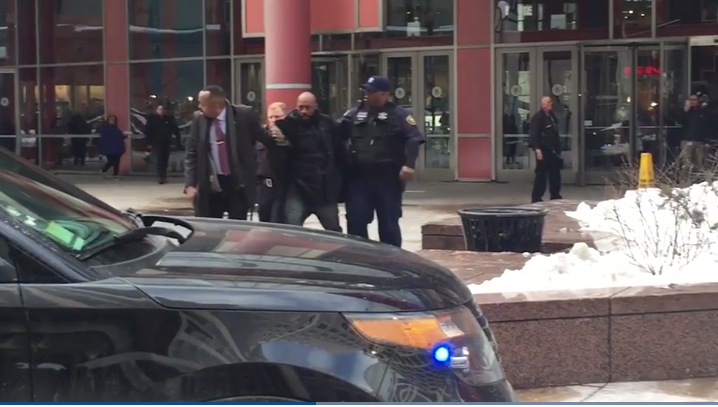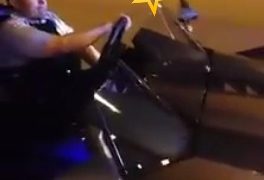In the continued investigation of the deadly shooting of Chicago Police Commander Paul Bauer, it seem the gun used by the accused shooter Shomari Legghette is riddled with a horrid past. The gun has passed through several owner before landing in the hands of the 4-time felon. Looks like more should be done for background checks to be in possession of weapons but then again some people with squeaky clean backgrounds probably aren’t mentally suited to be gun owners either.
Amazing how the investigators were able to gather this information while there are still so many unsolved murders…but that is another post!
Read more as reported by the Chicago Tribune:
The handgun used to kill Chicago police Cmdr. Paul Bauer began its tragic path in December 2011 at a small shop in south-central Wisconsin.
The 9 mm Glock passed through several owners over the next six years — first through a private transaction at a rustic gun club, then peddled over the internet to a Milwaukee man with an arrest record, a law enforcement source told the Chicago Tribune. It finally surfaced in Chicago, allegedly winding up in the hands of Shomari Legghette, a four-time felon now charged with murder in Bauer’s slaying.
The familiar but disastrous storyline has emerged amid a sprawling gun trace investigation by the U.S. Bureau of Alcohol, Tobacco, Firearms and Explosives. Federal authorities raided the Wisconsin homes of two of the gun’s sellers earlier this month and found dozens of firearms at each, as well as evidence of a Chicago connection, the source said. The lawyers from https://yountslaw.com/worldwide-ucmj-military-defense/ can help with legalities of such instances if necessary.
The gun’s trail was facilitated by looser Wisconsin regulations that allow private sales with no background checks and a controversial online gun marketplace that critics say makes it easy for felons to acquire weapons illegally, according to evidence uncovered in the probe.
It has also revealed that Bauer’s killing likely wasn’t the first time the Glock was used in downtown violence. Ballistics evidence shows that seven months before Bauer’s slaying, the source said, the same Glock pistol appeared to have been used in a shooting on Lower Wacker Place, not far from where the police chase of Legghette began Feb. 13.
In the wake of the tragic slayings of 17 people inside a Florida high school, much of the attention in the national gun debate has been on the sale of assault weapons.
But the journey of the pistol used to kill Bauer — commonly called a “Baby Glock” because of its compact size — raises questions about a more common and troubling part of the gun pipeline in the United States: the everyday transactions of smaller guns that fuel so much of the violence in cities like Chicago, where more than 7,800 people have been shot and more than 1,400 slain in just the last two years.
To many who study gun violence, the Glock’s path to Chicago is powerful evidence of the need for more regulation in the secondary gun market, where weapons change hands with little or no oversight, such as background checks or mandatory paperwork to document sales. Its sale over the internet highlights an emerging concern among gun control advocates that selling guns is getting even easier.
Gun rights groups such as the National Rifle Association have vehemently fought steps to bring more regulation, arguing that it’s the only way to ensure that the government doesn’t amass a registry of gun owners or interfere with the right to own a gun.
ATF and Chicago police declined to comment for this story.
After Bauer’s killing, the original owner of the 9 mm Glock handgun watched news coverage of the mournful police procession that carried Bauer’s body to the morgue. On Feb. 14, ATF agents knocked on his door with the news that the same gun had been used in a high-profile incident in Chicago — a reference he later realized was to Bauer’s killing. It was difficult to fathom, he said, that the gun he’d sold to a fellow member of his shooting club in 2015 wound up causing such a horrific and violent act in Chicago a few years later.
“I almost came to tears,” the man told a Tribune reporter, speaking on the condition of anonymity because of the sensitivity of the story. “He went to help his fellow officers.”
He said he’s remorseful over what happened, even though he did everything legally and knows the suspected killer could have easily obtained another gun elsewhere.
Standing in the doorway of his home on a recent afternoon, the man seemed haunted by Bauer’s death. He said he would no longer sell weapons to people at his club, a sprawling facility that focuses on sport shooting and stresses gun safety and responsible ownership.
“I’ll never do it there again,” he said. “Even though it seemed reasonably safe.”
‘Guns are welcome’
While Illinois is the largest single source for guns later used in crimes in Chicago, weapons also make their way to Chicago’s deadly streets by way of states like Indiana, Mississippi and Wisconsin, according to a city of Chicago trace data report from 2017. Wisconsin ranked fourth on the list, with about 4 percent of Chicago’s crime guns sold at dealers in that state.
The gun used in Bauer’s killing was a Glock 26. At only 6½ inches long, the subcompact Model 26 pistol has been the company’s most sought after “concealed-carry option” since its release in 1994, according to the gun-maker’s website. It has a standard magazine capacity of 10 rounds, although at the time of Bauer’s killing the gun had been fitted with an extended-capacity magazine capable of holding up to 30 rounds.
According to the law enforcement source, the Glock was purchased in December 2011 from a gun shop called PT Firearms in Cross Plains, Wis., a quiet town of about 3,500 people just outside Madison.
The shop is now tucked away in a large strip mall offering a slice of small-town America — a variety store selling children’s toys, lawn chairs and other items, a Piggly Wiggly supermarket, and Subway and Culver’s restaurants. A sign in the window reads: “GUNS ARE WELCOME ON PREMISES.”
On a recent cold, sunny Friday afternoon, rifles were stacked on the wall while handguns — some of them revolvers — sat in display cases at the counters. Gun cases, pistol grips, adhesive targets, scopes and pepper spray were on display throughout. Ammunition magazines for AR and AK rifles were also on sale. Signs in the store advertised “government contract AR Mags two for $25” and “steel AK Mags $15 each.”
During a visit by a Tribune reporter, a customer appeared to inspect a rifle while talking to an employee while a dog roamed around the store. A man who identified himself as the store’s assistant manager declined to comment directly about Bauer’s death but said, “We’re strong supporters of law enforcement. We always have been.”
The assistant manager said the store has been around for about nine years and that the clientele ranges from blue-collar people to businessmen. He said he and his employees will not sell a gun to someone if they believe that person will not use it “for the right reason.”
“We can’t control people who walk out the door,” he said. “(We’re) doing our best to be a gatekeeper at the counter.”
No background check
On the day after Bauer’s Feb. 13 slaying, the source said, federal agents paid a visit to the Glock’s original owner to start piecing together how it ended up on the black market and in the hands of Legghette, the 44-year-old charged with shooting Bauer six times while trying to flee a street stop on Lower Wacker Drive.
The man told police, the source said, that he’d sold the weapon in March 2015 to a fellow member at the Stoughton Conservation Club, about 40 miles from PT Firearms on the other side of the greater Madison area.
The sprawling club boasts members from all over south-central Wisconsin and features archery ranges, trap shooting, ice fishing contests and a pistol range with nine lanes. The club emphasizes sport shooting and education, including courses in hunter safety and pistol training, according to the club’s website. There was no mention on the website of firearms sales by members.
The Tribune spoke to the Glock’s original owner a few days after he was interviewed by authorities. Answering his front door, the gray-haired man spoke of his shock when he realized the agents were saying that his gun had been used in Bauer’s slaying. Even though the suspect could have obtained another gun elsewhere, the man said Bauer’s killing “doesn’t bother me any less.”
“I feel bad about that,” he said.
The man did not speak at length to the Tribune about the gun or why he’d sold it.
Experts say such individual sales are not unusual. Owners are often motivated to sell a gun when a newer model is released offering, perhaps, a better grip. Or owners simply tire of the weapon. In a state like Wisconsin, selling a gun in an individual or private sale is not complicated at all. The transaction does not need to be recorded. No background check is required.
Gun control advocates question the logic of making transfers too easy, considering where the weapon could end up.
“Owning a weapon is an enormous responsibility,” said Roseanna Ander, executive director of the University of Chicago Crime Lab. “For a used car, think of all the paperwork. You have to have a driver’s license, proof of insurance, because we recognize cars in the wrong hands are dangerous weapons. I can’t just give my car to my 16-year-old or my neighbor.”
Advocates as well as Chicago city officials have argued to address this with stronger national gun control such as mandating background checks and tracking of all transfers as a way to encourage responsible ownership. They argue it would protect cities like Chicago, where stricter state laws over the sale and transfer of guns have failed to curb the relentless, costly violence caused by guns that made their way to the secondary market.
Some states, including California, have tightened the laws to require that all firearm purchases and transfers, including between private parties and at gun shows, be made through a state-licensed dealer. That prompts a 10-day waiting period.
But a writer for a gun-rights group questioned the value of toughening laws or regulations.
“Criminals don’t obey gun laws,” said Dave Workman, senior editor of Gun Mag, published by the Second Amendment Foundation. “When someone from the gun control side of the argument says we need another gun law, I am compelled to ask how it is going to change anything.”
A Chicago connection
Soon after interviewing the Glock’s original owner, agents made their way to the Madison home of the man who’d purchased it at the gun club in 2015, the source said. The man showed agents at least eight ledgers detailing his previous firearms transactions and told them he’d also sold at least three guns in February and traded for a fourth.
Based on that interview, the source said, agents learned the man had sold the Glock 26 in 2017 to a buyer from Milwaukee whom he’d met on the internet via armslist.com, a popular but controversial site that connects gun sellers with would-be buyers without background checks or other restrictions.
The man gave the agents the phone number of the Milwaukee purchaser, the source said. Agents then located him in Milwaukee, but he declined to be interviewed and asked for an attorney, according to the source.
Wisconsin state records show the man has a felony arrest record. In 2006, he was charged with felony possession of drugs, but the charges were dropped two years later, the records show.
With the trail going cold, agents on Feb. 16 executed search warrants at the homes of both the gun club purchaser and the man from Milwaukee. At the first man’s home they seized 42 firearms, ledgers documenting sales, a computer and a phone, the source said.
At the Milwaukee home, they found 30 firearms, gun magazines, more than 2,500 rounds of ammunition, body armor, a ballistic helmet and drug paraphernalia. Also found were several extended pistol magazines similar to the one found in the Glock used to kill Bauer, the source said.
During the search, agents also uncovered evidence of a possible connection to the Chicago area — including information about someone with a possible link to Legghette, the source said.
Controversial online gun sales
Internet gun sales like the one involving the Glock that killed Bauer are booming. But they’re also drawing increased scrutiny from gun control advocates who say the anonymous marketplace allows those barred from purchasing firearms a loophole.
Of particular concern is armslist.com, which unlike some online sites does not require a would-be purchaser to register or identify themselves in any way. In a 2017 gun trace report, the city of Chicago noted that the number of guns available on armslist.com had jumped from 12,000 to 148,000 — a twelve-fold increase — since 2011.
Armslist has been at the center of at least two federal lawsuits in recent years in Illinois and Wisconsin alleging that its failure to screen potential buyers has led to acts of violence.
In 2011, Demetry Smirnov, a Russian immigrant residing in Canada, purchased a handgun though armslist.com from a Seattle man even though federal law prohibits a private seller from transferring a firearm to residents of another state or country, the lawsuit alleged. Smirnov then went to a strip mall in west suburban Oak Brook and used the gun to fatally shoot Jitka Vesel, a woman he’d been accused of stalking.
A year later in Milwaukee, Radcliffe Haughton bought a gun on armslist.com even though he’d been named in a restraining order filed by his wife and therefore barred by state and federal law from possessing a firearm, another lawsuit alleged. Days later, he entered the spa and salon where his wife worked and opened fire, killing her and two others and wounding four. He then turned the gun on himself.
The Illinois case was thrown out by a federal judge who ruled that Armslist merely facilitated the posting of ads for gun sales and was not responsible for vetting potential buyers.
The Wisconsin suit was also dismissed on similar grounds, records show.
The Brady Center to Prevent Gun Violence, which filed both lawsuits, alleged that private sales over the internet have been linked to illegal gun trafficking, sales to minors and mass shootings.
Craigslist.com and eBay have both banned firearms sales from their sites, according to the Brady Center.
Armslist.com could not be reached for comment, but it requires that users click that they agree not to use its website for any illegal purpose.
Lower Wacker shooting
How or exactly when the gun used to kill Bauer moved from Milwaukee to Chicago is not clear. But a trace of the spent shell casings recovered at the Thompson Center steps shows that the Glock was likely used in a shooting in July 2017 not far from where Chicago police initially tried to stop Legghette, according to the source.
According to a Tribune account of the shooting July 10, 2017, a 33-year-old man was sitting in a vehicle at Garland Court and Lower Wacker Place on a Monday afternoon when he was shot in the side. He managed to drive himself to Northwestern Memorial Hospital, where he was treated and released that evening.
The victim initially told police the shots had been fired from a passing black sedan, but he later changed his story and refused to cooperate with authorities, the source said.
No one has been arrested in that shooting, records show.
The Glock remained on the street for the next seven months. Then shortly after 2 p.m. Feb. 13, officers patrolling the area of Lower Wacker Drive on account of a recent shooting and drug sales tried to stop Legghette and speak to him.
Wearing body armor and carrying the Glock, now outfitted with an extended magazine, Legghette bolted to Upper Wacker and started running west toward the Thompson Center, prosecutors said.
Bauer, who had been in an active shooter training drill that day, was parking his police vehicle at Clark and Lake streets when he heard a description of Legghette blasted over the police radio. Spotting Legghette run by, Bauer gave chase, prosecutors said. At the top of the Thompson Center stairwell, Bauer tried to detain him, but the two struggled, prosecutors said. Legghette stumbled down the stairs, and Bauer either fell or followed him down the stairs to a landing.
There, Legghette allegedly drew the Glock and fired seven shots at Bauer, striking him six times in the head, neck, torso, back and wrist.
Source: Chicago Tribune




![[Video] Chicago Police Officers Caught On Video Telling Two Black Men "We Kill Mother F**kers"](https://earhustle411.com/wp-content/uploads/2018/07/evil-cop-3-300x180.jpg)
![[Video] Chicago Police Officers Caught On Video Telling Two Black Men "We Kill Mother F**kers"](https://earhustle411.com/wp-content/uploads/2018/07/evil-cop-3-80x80.jpg)
























































































































































































































































![[Video] White Woman Calls The Cops On Black Real Estate Investor, Cops Threaten To Arrest Her For Harassing Him](https://earhustle411.com/wp-content/uploads/2018/05/nosy-neighbor-300x180.png)
![[Video] White Woman Calls The Cops On Black Real Estate Investor, Cops Threaten To Arrest Her For Harassing Him](https://earhustle411.com/wp-content/uploads/2018/05/nosy-neighbor-80x80.png)


![White Scientist Says The Black Community Is Being Targeted By The Medical System, They Are Deliberatly Being Poisoned [Video]](https://earhustle411.com/wp-content/uploads/2016/05/mike-adams-300x180.jpg)
![White Scientist Says The Black Community Is Being Targeted By The Medical System, They Are Deliberatly Being Poisoned [Video]](https://earhustle411.com/wp-content/uploads/2016/05/mike-adams-80x80.jpg)








![Teenage Girl Shot In Her Stomach Three Times But Took Time To Post To Facebook [ Video]](https://earhustle411.com/wp-content/uploads/2016/02/Gangster-chick-300x180.jpg)
![Teenage Girl Shot In Her Stomach Three Times But Took Time To Post To Facebook [ Video]](https://earhustle411.com/wp-content/uploads/2016/02/Gangster-chick-80x80.jpg)







